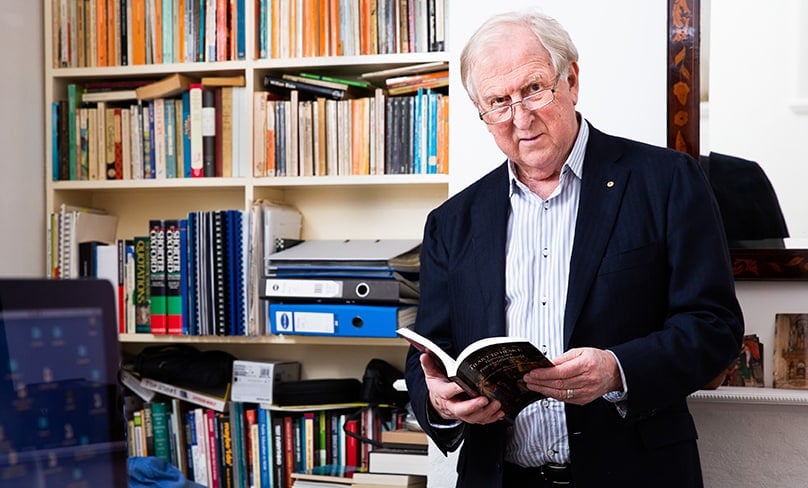
With a communist father and a Catholic mother, a childhood divided between the radical Eureka youth group and the life of the church, and a radical university life spent attending rallies and taking consciousness-raising trips to India and Afghanistan, it may have surprised the young Kevin Donnelly that he would go on to choose God and write a book in defence of Christianity.
But Donnelly’s latest book Christianity Is Good For Us, published by Wilkinson Publishing with a foreword by Cardinal George Pell, shows the deeper currents of life tend to win out.
Christianity Is Good For Us, a collection of almost a decade of the author’s columns on faith and the role of Christianity in public life, approaches the position of faith in Australian society through three issues: the centrality of Christianity to the enduring civilisation of the West, the place of Christianity in school curricula, and the question of religious freedom.
The columns are not short on ideas and references; but the foundation of Donnelly’s appreciation for Christianity is personal, the result of his tough childhood in the working-class Melbourne suburb of Broadmeadows.
“In the dark times when I was a young kid, I can remember going up and walking around St Dominic’s, and I looked at the Stations of the Cross.”
“My upbringing was pretty hard – I’m not complaining, if you can get through life untouched you’ve won the lottery – but dad was a violent alcoholic, he used to beat up on mum,” Donnelly told The Catholic Weekly.
“In the dark times when I was a young kid, I can remember going up and walking around St Dominic’s, and I looked at the Stations of the Cross.
“It made me think, and feel, that Jesus had suffered such agony and vitriol and pain, and that he was tempted by the devil and had his doubts and fears, and on the Cross said, ‘Father why have you forsaken me?’
“It gave me a sense that if he could endure it, and if you can find God’s love and God’s grace, then that helps you with endurance and resilience.”
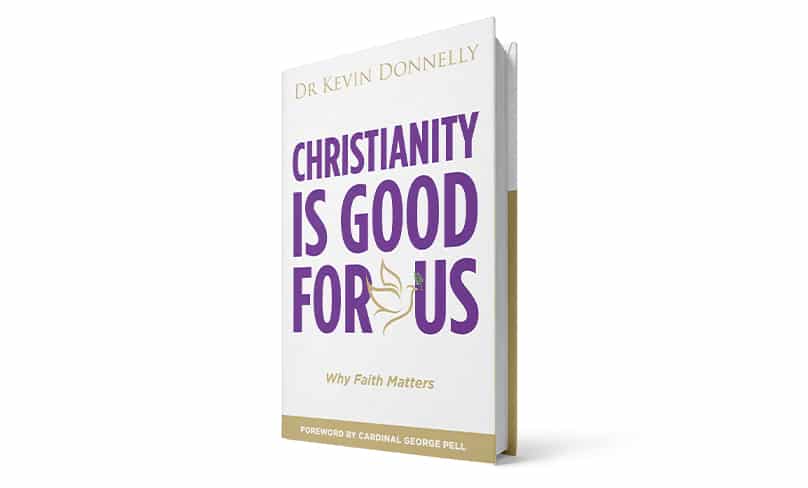
Literature, in particular old Norse and Greek mythology, as well as Christian scripture, “became for me a lifesaver”, Donnelly said of his childhood.
“It opened up a whole new world of the imagination, of resilience and endurance, a sense of the transcendental and spiritual.”
In his teenage years, Donnelly was introduced to Christian thinkers from CS Lewis to Teilhard de Chardin in a book club run by a local Anglican priest.
“His idea was that working class kids could get into this heavy stuff, and understand it.”
A more recent influence is the 14th century English mystic Julian of Norwich, to whom Donnelly and his wife turned after their 20-year-old son, James, was killed in a hit-and-run in 2002.
“While education has a practical and utilitarian purpose, it is also true that the curriculum deals with significant existential questions about the nature and purpose of life.”
“I’m not saying I’m a perfect Catholic and I’ve committed sins as we all do, being human,” Donnelly stresses, while recommending living by Norwich’s maxim that “if you give yourself up to Jesus and to the enduring love of God’s grace, ‘All shall be well, and all shall be well, and all manner of things shall be well.’”
Donnelly’s arguments for the richness of Christian life and culture, and against the “quasi-religion” of “extreme secularism”, build upon his own experience of Christianity as necessary for personal and social resilience, and for human flourishing.
But he was also formed by his experiences as a high school teacher under former Victorian Premier Joan Kirner, during the introduction of the Victorian Certificate of Education (VCE), and his later PhD study of the Christian humanist tradition of educators like Matthew Arnold and Cardinal John Henry Newman.
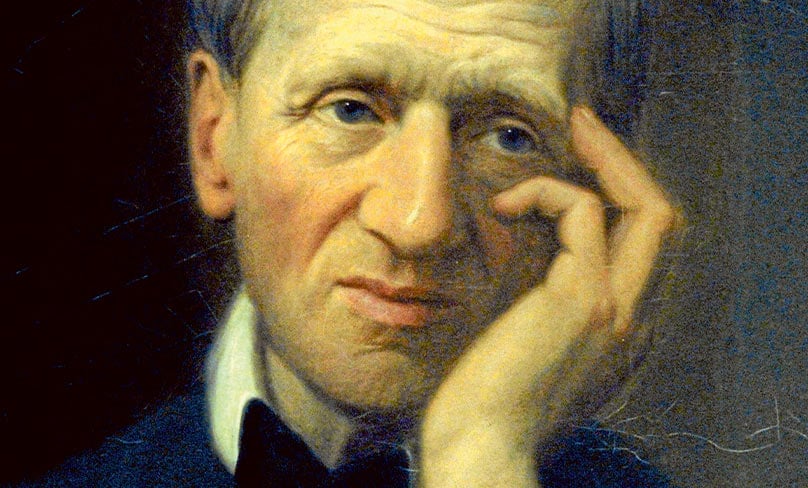
His study of Catholic thought on education “crystallised” his belief that schooling was not for the sake of social engineering.
Education, Donnelly says, is about “inculturation” that takes the form of a duty of care to the next generation.
“You have to ask the question as a teacher, ‘What’s the purpose of education? What are we doing this for? What do we want kids to achieve? What kind of society do we want?’”
In one column from Christianity Is Good For Us, “Religion and belief systems have a place in the school curriculum”, he writes:
“While education has a practical and utilitarian purpose, it is also true that the curriculum deals with significant existential questions about the nature and purpose of life.
“Concepts like the inherent dignity of the person, the right to liberty and freedom and a commitment to social justice and the common good arose as a result of Christ’s teachings detailed in the New Testament.”
“Including religions and belief systems in the curriculum adds a much-needed transcendent element in an increasingly material, self-centred world.”
By contrast, Donnelly saw the changes in education during the 1990s as part of postmodernity’s drive to critique and deconstruct, instead of passing on an enduring legacy to children.
“Education became about overthrowing the status quo and changing society, and turning kids into culture warriors of the left,” Donnelly said.
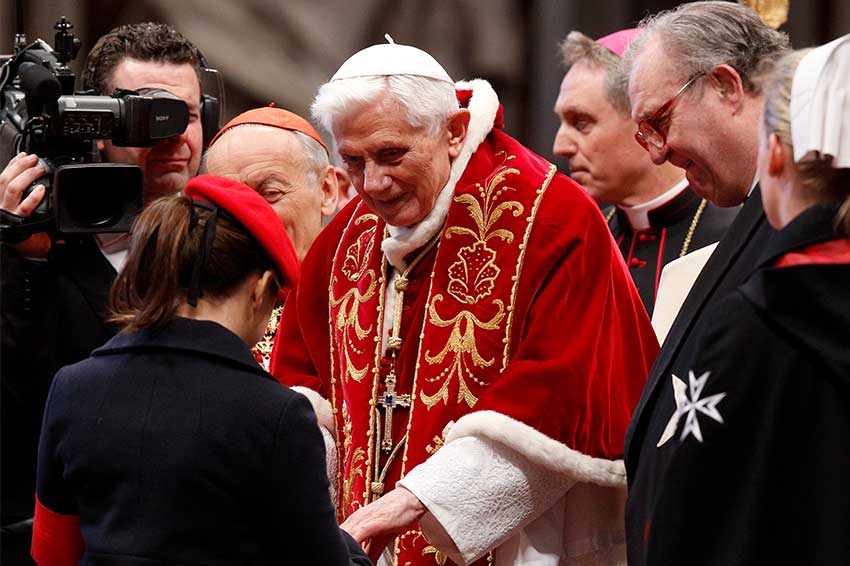
Donnelly joins other contemporary conservative writers in attributing the origin of political correctness and “cancel culture” to the Frankfurt School of 20th century Marxist philosophers, such as Max Horkheimer and Theodore Adorno, who developed a stinging critique of Western Civilisation as the self-defeating progeny of the ruling class.
He also cites the Italian Marxist Antonio Gramsci, who regarded socialism as “precisely the religion that must overwhelm Christianity”, as another important influence on contemporary “extreme secularism”.
Donnelly’s columns are replete with references to his own intellectual heroes: TS Eliot, Pope Emeritus Benedict XVI, George Orwell, British philosopher Roger Scruton, Belgian-Australian intellectual Pierre Ryckmans (also known by his pseudonym, Simon Leys) and Italian philosopher Augusto Del Noce, who has recently come to prominence in the Anglophone world thanks to new translations.
These thinkers all have in common the view that unless our secular society acknowledges its debt to Christianity, it risks losing sight of the things that make Australia, and our Western cultural inheritance, so attractive.
“We cannot take the freedom to hold and practice our beliefs for granted, even here in Australia’ and it is vital that committed Christians enter the public debate and win the battle of idea.”
“Concepts like the inherent dignity of the person, the right to liberty and freedom and a commitment to social justice and the common good arose as a result of Christ’s teachings detailed in the New Testament,” Donnelly writes in his introduction to Christianity Is Good For Us.
Without Christianity, cultures risk degenerating into totalitarianism by denying the sacredness of human beings, and instead giving way to what Del Noce argues are the hallmarks of the emerging Western post-Christian world: scientism, eroticism and secularism.
Donnelly believes Australian Christians are beginning to feel the consequences of secularisation through an increasing number of legal and cultural imposts on religious freedom, such as the trial of Cardinal George Pell, the Safe Schools programme, the withering treatment of Israel Folau and Margaret Court.
All these episodes are part of a concerted campaign to marginalise and ultimately banish religious practice from the public sphere, the author argues.
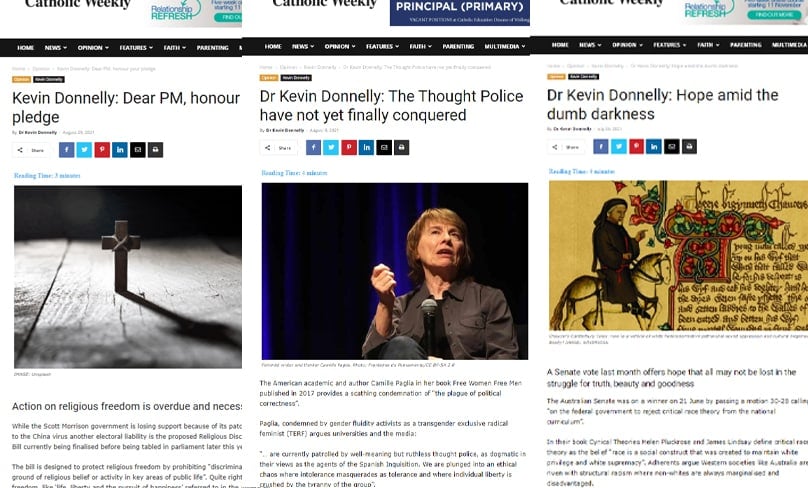
“As stated by Archbishop Fisher ‘We cannot take the freedom to hold and practice our beliefs for granted, even here in Australia’ and it is vital that committed Christians enter the public debate and win the battle of ideas,” he writes.
Among the strongest columns in the collection are those in which Donnelly discusses the difference between virtues and values, a distinction between a deep and enriching view of life versus a “checklist mentality”.
“If we are to understand and interact with others, you need a very strong, enriching sense of virtues – of what constitutes right action, what constitutes the common good, and if there are things like love, trust, honesty, courage, prudence, then they’re the things we should hold on to and teach young people,” Donnelly said.
The alternative “values” approach is often no more than a contradictory, superficial and insubstantial checklist: “Things like being friendly, or doing the right thing, or doing your best. So superficial. Motherhood statements without substance or richness.”
“Donnelly believes Australian Christians are beginning to feel the consequences of secularisation through an increasing number of legal and cultural imposts on religious freedom, such as the trial of Cardinal George Pell, the Safe Schools programme, the withering treatment of Israel Folau and Margaret Court.”
Values might make us feel comfortable, but they do not inspire the resilience and depth needed to commit to the common good. Nor do they compel us to take risks to defend and promote our beliefs.
How does a person become convicted enough to face up to the challenge of life?
For Donnelly, “It could be the working class, bog Irish Catholic upbringing! Maybe it’s in the blood.”
Christianity Is Good For Us is out now, from Wilkinson Publishing.
Order all your books from The Mustard Seed Bookshop: www.mustardseed.org.au
